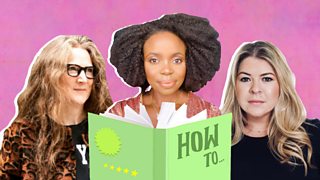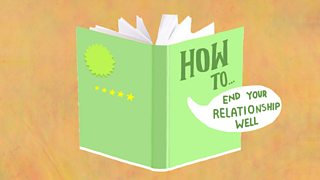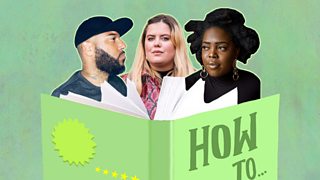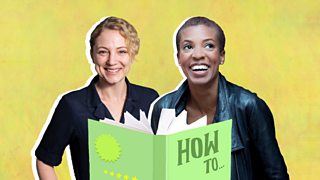Emma Gannon: I鈥檓 made to feel guilty for not having children
In her debut novel Olive, writer and podcaster Emma Gannon explores the decision to be child-free by choice. Her 33-year-old protagonist Olive is at a crossroads in her life, where she and her lifelong friends are starting to feel very differently about motherhood. Here Emma talks to Woman’s Hour about why she chose to address the topic, the stigma around publicly declaring you don’t want to have children and what it means to her…
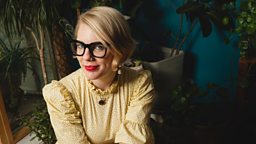
I wanted to show a protagonist who isn’t going down the motherhood route.
We meet Olive at the beginning of the novel having just broken up with her boyfriend of 10 years. It's because they hadn't really had 'the baby conversation' - it hadn't really come up. And it transpires that he really wants to have a family and she doesn’t. We follow Olive's journey being child-free by choice, but navigating her friendships where her three best friends very much want to be mothers and are going down their own very different paths. One of the friends is going through IVF and finding it incredibly difficult to be around their other friend who's newly pregnant. And then you've got the third friend who’s done the baby thing very early in life, so she's in her early thirties but has three children. Olive’s figuring things out and maybe feeling a bit left out.
When you’re in your 20s and younger you have the same milestones in life.
You feel very connected [to your friends], you're a bit of a unit, you make decisions together. And then suddenly your best friend can turn around and say, 'I'm pregnant!', and you can have this weird feeling of, 'Hang on a minute. That wasn’t supposed to happen. We were supposed to do things together!'. You start feeling very, very different from your friends suddenly. Maybe being a bit selfish in ways, feeling like your ‘thing’ matters the most. The friendship group can get a bit tense at times.
I’ve really felt the momentum of the ‘child-free by choice’ conversation.
A lot of younger women in their 20s are getting in touch [about the book] saying, 'I feel so relieved, I've always felt this way'. But also older women who feel really unapologetic and really happy with their life choices, but have always felt the stigma of society and their family members. You’d think we would have gone past this, and I am getting some comments saying, 'wow, we're still talking about this?.'
I’m feeling it personally at the moment. I'm 31, I'm getting married next year. These questions are really coming for me. It feels like everyone just wants a reason, or they want to hear that you might change your mind. Or they just want to feel justified that you know what you’re doing and you're doing the right thing. We're not there yet where people can just nod and think, ‘OK, great. Great for you.'
It’s the small talk that grinds me down.
I feel very lucky, I have a family who just wants the best for me. But I’m from a really big family, I get this sense a lot of child-free women maybe feel ‘off the hook’ because they have siblings that have children. So you can be the one who just chills out and doesn't do that. But that shows that I've internalised it being a strange thing to do.
I have not had that pushback from my immediate circle, the real thing is acquaintances, people at parties or at a meeting. When people talk about the weather but then they also just casually say, ‘do you have children?’ Or when people have a baby and then people say, 'are you going to have another one?’'. It’s that social conversation that has worn me down a bit.
I think it's more than okay to cut the conversation short.
Sometimes people want to ask you if you'll change your mind, or ask you to justify your decision (which baffles me every time!). So sometimes it's probably just best to move the conversation on, if it's not something you want someone delving in to. Hopefully it gives some sort of hint to the other person that it's not something to be prodded at, or debated, or something that should be a big deal at all.
I’ve been asked if it’s because of my career.
People say, ‘is it because you want to go and write your books?’, and ‘is it because you can do X, Y and Z?’. And it's true that I really do have something that fulfills me and I'm actually really excited about the life I’m hopefully going to have. But it's interesting, [author] Zadie Smith talks about having children and says it’s made her productive in her work and more productive in her writing. So I think there's such a case for having children, I think it looks amazing for many others but - hopefully regardless of my career - it's not something that I've felt is for me.
Having a kid is not a safety net.
[In the book] Dorothy is Olive’s next door neighbour, she's in her 80s. It turns out that she had a child and he moved to Australia when he was in his 20s and she hasn't seen her son for years. I really wanted to show that it's not straight forward even if you have a child. That doesn't mean you're going to be close. That doesn't mean they're going to look after you when you're old. I put that in to show the nuance. It’s not just 'have a child and everything will be great!'. This is a lifelong journey and everyone has their ups and downs.
Women are made to feel guilty for everything.
I’m made to feel guilty for not having children, people are made to feel guilty for having children, having careers. There’s no escapism from that thing that's put onto women. So I feel like there is unity in this conversation.
It's just about not projecting your concerns or fears onto another person. Worrying about being lonely when you're older might be your fear, but it doesn't mean it's somebody else’s. If a woman has made the choice to be child-free it means she is happy in her decision and it should be celebrated like any other decision in life.
Listen to Emma Gannon talk to Woman’s Hour on 主播大秀 Sounds, where you can also listen to any of the episodes you may have missed. Follow us and join the conversation on or @bbcwomanshour.
